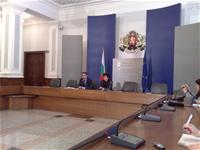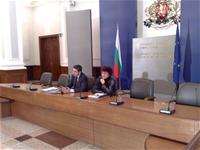Decentralisation in spite of the feudalisation in Bulgaria
euinside, January 21, 2010
 By the summer, at the latest the government should have the list of public services that will be given to the regions in Bulgaria for local provision. This deadline was defined so that the financial security of the services could be envisaged in the budget for 2011, the members of the Decentralisation Council of Bulgaria has agreed on Tuesday after its first session for 2010, presided by its chairman the minister of regional development Rosen Plevneliev. The Council did not discuss any particular services that could be given to the municipalities because it dealt mainly with the Decentralisation Strategy until 2013 and has established a working group which will gather every week to question representatives from different ministries until an agreement is reached on which services could be decentralised.
By the summer, at the latest the government should have the list of public services that will be given to the regions in Bulgaria for local provision. This deadline was defined so that the financial security of the services could be envisaged in the budget for 2011, the members of the Decentralisation Council of Bulgaria has agreed on Tuesday after its first session for 2010, presided by its chairman the minister of regional development Rosen Plevneliev. The Council did not discuss any particular services that could be given to the municipalities because it dealt mainly with the Decentralisation Strategy until 2013 and has established a working group which will gather every week to question representatives from different ministries until an agreement is reached on which services could be decentralised.
According to Rosen Plevneliev Bulgaria is over-centralised country and in the last 12 years there were no reforms at all. Separately from decentralisation, the government intends to consider deconcentration, the minister added. It means transfer of land and resources from national to regional or municipal level.
Too good sounded the words of the minister regarding the forthcoming reform of regions and the visions of the government for a balance between the regions and the state. "How convenient it would be for the government of GERB (the ruling centre right party) to do what the previous governments did - let us pour money as lees as we have so as to win the local elections. This is going to end! This is not European!" Mr. Plevneliev admitted though that a significant process of feudalisation was going on in some municipalities, seized by mafia groupings and the government knew which municipalities were those. In the same time he underlined that the reform would not stop because of them.
The way the government will control regions would be through money - by stopping the flow of money to those which provide bad quality public services. On the contrary, the good performing municipalities and regions will be motivated and stimulated.
"The state will have in the next month and a half or two, under the pressure of our ministry, to consider which functions to outsource to the regions. We will do this with the Construction Control. The next issue is the road agencies. Probably you are aware that it is not normal for a minister to deal with which road is cleaned and which not, which hole is filled and which not. Why should a minister decided which road to be repaired and which not? Why? On the other hand, this is a convenient excuse for the mayors and from a third point of view this is a problem of the citizens of Bulgaria because somewhere between the mayor and the minister the holes remain", Rosen Plevneliev added regarding government's will to introduce a thorough decentralisation reform.
Still, financing remains a serious problem for such a reform. There are a lot of small and deserted municipalities which need financial resources no matter what quality of services they provide and no matter their right to define taxes themselves just because there are not too many people living there and paying taxes. Given the complex situation of the national budget as well and the not too good perspectives for the Bulgarian economy this and next year, it is not quite clear to what extent the government will be able to start the reform.
The president of the National Association of Bulgarian Municipalities Ghinka Chavdarova  unambiguously pointed out that at this stage the Association did not plan a quality change in services the municipalities provide. They mostly insist for a clear division of rights and responsibilities. On the contrary, "we do not offer a quality change, quite the opposite - there a lot of propositions for reconsideration of some competences", Ms. Chavdarova said. The only field the Association wanted more rights was education. The other sector where municipalities would like to be more independent was the creation of voluntary fire brigades and municipal police, especially in small regions.
unambiguously pointed out that at this stage the Association did not plan a quality change in services the municipalities provide. They mostly insist for a clear division of rights and responsibilities. On the contrary, "we do not offer a quality change, quite the opposite - there a lot of propositions for reconsideration of some competences", Ms. Chavdarova said. The only field the Association wanted more rights was education. The other sector where municipalities would like to be more independent was the creation of voluntary fire brigades and municipal police, especially in small regions.
At least by mid-February the working group will gather every week. Minister Plevneliev promised that with each gathering there would be more clarity on what compromise the regions and the state might reach in the end.